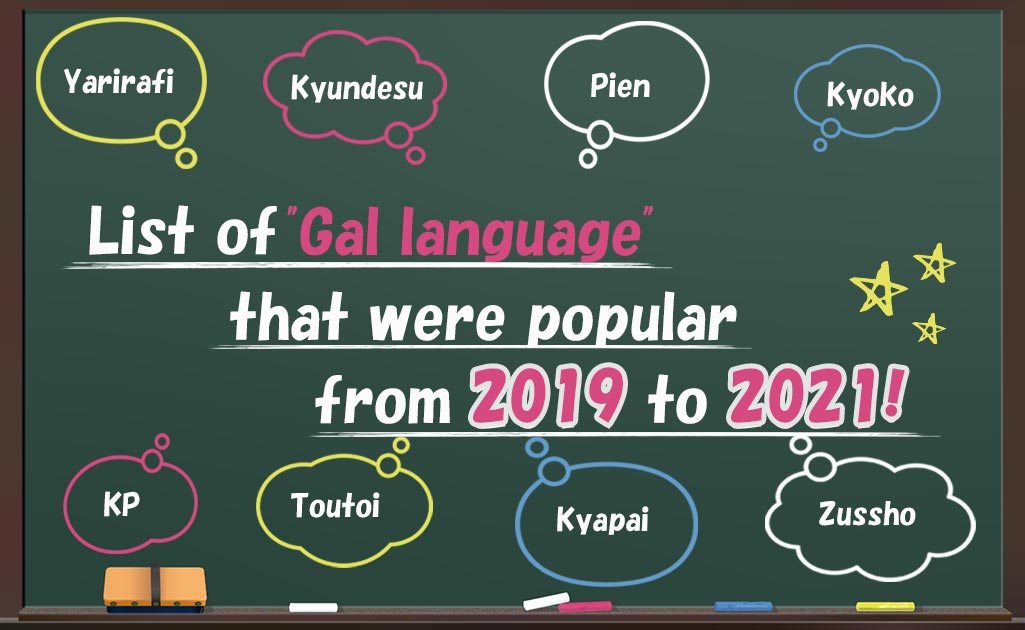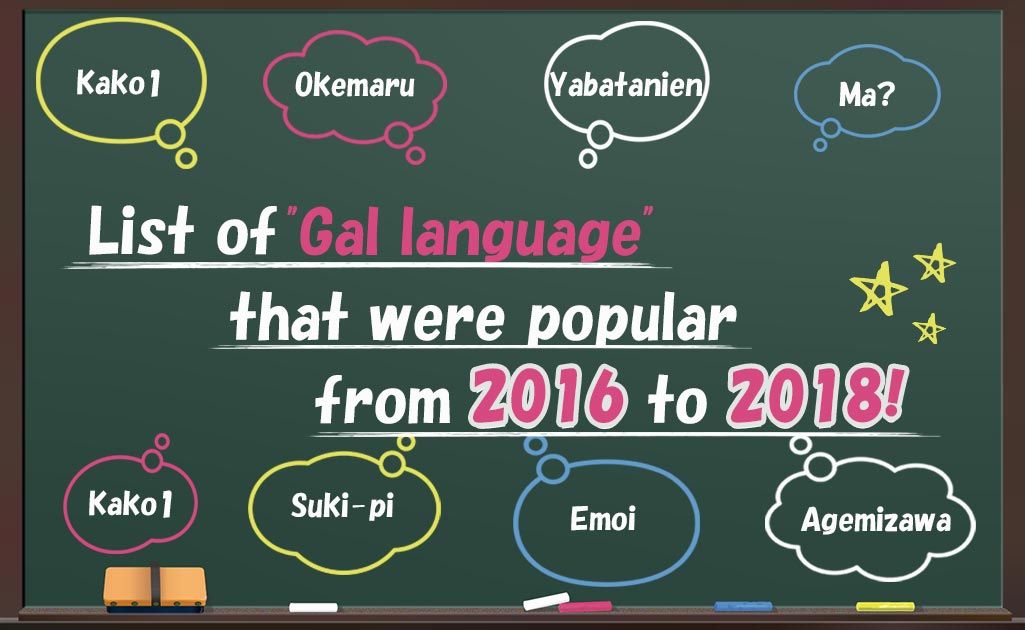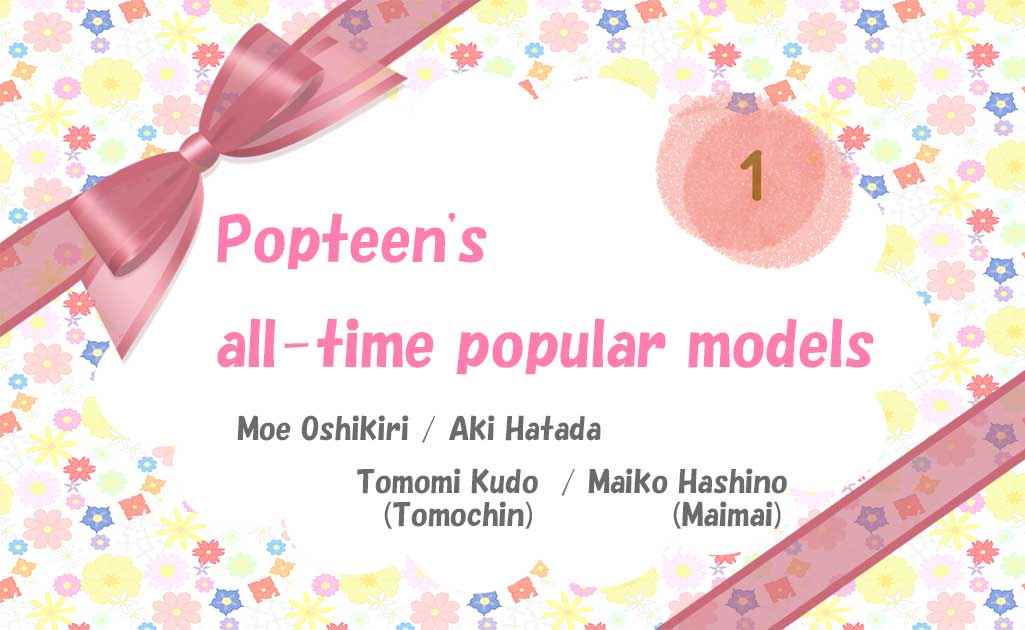Among Reiwa gals, Heisei gal fashion, such as the "loose socks" that were popular in the 1990s, is becoming popular again.
Under these circumstances, "Gyaru language" is once again attracting attention.
Gal language was popular in the mid-1990s.
Not only fashion, but also the words of the time seem to be interesting among Reiwa gals.
This article picks up some gyaru words that are popular in the Reiwa era and introduces their meanings and usage.
KP
"KP" took the top spot with flying colors in the 2019 Gal buzzword awards.
It's a typical youth slang often used on platforms like Nico Nico Douga and YouTube!
| KP | Meaning | It means "cheers." This is a romanization of the Japanese word "Kanpai," which takes two letters. |
|---|---|---|
| Usage | It is used when toasting with friends. It is popular among high school girls as it can be used not only for alcohol but also for toasting with soft drinks. While it can be used in everyday conversations, it's more frequently seen online. |
|
| Example sentence | A: Alright, everyone, hold your cups up! KP! B: KP! |
Pien
"Pien" secured the second place in the 2019 Gal buzzword awards and topped the 2019 JCJK buzzword Ranking.
It's widely used across social media, YouTube, television, and more.
| Pien | Meaning | It's a shortened form of "Pie-n," which represents a crying face (🥺). |
|---|---|---|
| Usage | It's used when something slightly sad or disappointing happens. It's also used to express tears of joy. Speaking it in a cute manner is key. |
|
| Example sentence | Even though it's not payday yet, I'm already broke. Pien. I thought I lost my earrings, but I found them. I'm so happy, Pien. |
Wakarimi-ga-hukai
You often see "Wakarimi-ga-hukai" on social media.
It ranked third in the 2019 Gal buzzword awards and is still popular among many young people.
| Wakarimi-ga-hukai | Meaning | This word is a variation of the Japanese word "Wakaru", which means to understand. It's a variation of "Wakaru", with "Mi" added to create "Wakarimi." By adding "Hukai" to "Wakarimi," you can express even stronger empathy. |
|---|---|---|
| Usage | It's used when you agree with someone's opinion or deeply empathize with them. | |
| Example sentence | A: It's annoying how the city is filled with couples as Christmas approaches. B: Wakarimi-ga-hukai.(I totally get that.) I want a boyfriend too. |
Goiryoku
"Goiryoku" ranked fifth in the 2019 Gal buzzword awards.
It's a word often used in social media posts and conversations, but what does it really mean?
| Goiryoku | Meaning | "Goiryoku" refers to vocabulary power. In other words, it is a word that shows how many words you know. |
|---|---|---|
| Usage | It's used when you can only think of common expressions or when you want to convey something but can't find the right words. It can also be used humorously in conversations as a form of teasing, like saying "You need a better vocabulary!" |
|
| Example sentence | For now, my crush is so cute it's indescribable (Goiryoku). A: Isn't this part of this outfit cute? B: Goiryoku😂 |
Kyoko
On Instagram, there's a trend among fashion enthusiasts to share their outfits.
"Kyoko," which emerged from this trend, secured the ninth place in the 2019 Gal buzzword awards.
If you're a regular social media user, this is a word to check out.
| Kyoko | Meaning | It is an abbreviation of the Japanese word "kyou-no-coordinate" which means "today's outfit." |
|---|---|---|
| Usage | When posting a fashion outfit on Instagram, it's common to use "#きょコ" as a hashtag. Using this hashtag helps connect you with people who share similar interests through social media. |
|
| Example sentence | Going out with my new coat today! ♥️ #Kyoko #WantToConnectWithFashionistas |
Yarirafi
"Yarirafi " secured the top spot in the 2020 Gal buzzword awards.
This word became popular because a phrase from the song "CHERNOBYL 2017" used on TikTok sounded like "Yarirafi."
| Yarirafi | Meaning | It's synonymous with "Paripi." In other words, it signifies someone who is high-spirited and having a lot of fun. |
|---|---|---|
| Usage | It's used when you're hanging out with friends, having a great time, or when your excitement levels are through the roof. Additionally, it can be used to describe someone who looks flashy or flamboyant. |
|
| Example sentence | I had a blast yarirafi with my friends until morning! I was hit on by a yarirafi at the beach. |
~Shika-katan
"~Shika-katan" secured the second place in the 2020 Gal buzzword awards.
You might have heard this word on YouTube, television, and other media platforms.
It originally gained attention when fans of idols used it, saying "Oshi-shika-katan."
| ~Shika-katan | Meaning | It means that I like xx more than anything, xx is the best, xx is the only choice, etc. |
|---|---|---|
| Usage | It's used to express the feeling that you have no interest in anything other than what you love or prefer. This can apply to idols, celebrities, food, characters, or anything else you're passionate about. |
|
| Example sentence | When it comes to tapioca, it's tapioca milk tea shika-katan. |
Kyundesu
"Kyundesu" became a viral word thanks to TikTok and ranked second in the 2020 egg buzzword awards and the 2020 JCJK buzzword ranking!
It's a youth slang that's popular not only among gals but also among many young people.
On TikTok, it became famous for its cute choreography set to the song "Pocket-kara-kyundesu."
| Kyundesu | Meaning | "Kyun desu" means to make your heart flutter. This word is derived from the Japanese word for heart-pounding, "mune-kyun." |
|---|---|---|
| Usage | It's used when something makes your heart race, like when you find something or someone cute or when you're feeling affectionate. It can be used to express these feelings towards people's actions, gestures, or even things like animals or characters. |
|
| Example sentence | The way my cat sleeps is so cute! Just looking at it makes my heart go kyundesu. His smile when he unexpectedly shows it is seriously kyundesu. |
Paon(Pien-koete-Paon)
"Paon" is a word that became popular around 2020, and is an evolution of "Pien."
| Paon (Pien-koete-Paon) |
Meaning | "Paon" is an evolution of "Pien," which represents crying. Originally, "Pien" was used to express emotions like happiness or sadness, and "Paon" amplifies that expression. |
|---|---|---|
| Usage | It's used when you want to convey intense emotions, such as when you're extremely happy or sad. It's mainly used in written communication, like on social media or in text messages. Adding "Paon" to the end of a sentence gives it a cute and emotional tone. It can also be used in the form "Pien-koete-Paon" to emphasize the emotional intensity. |
|
| Example sentence | Someone I like confessed to me today. I'm so happy, Paon! Another all-nighter of studying today. It's Pien-koete-Paon for me. |
~Sasetemorote
"~Sasetemorote" or "~Shitemorote" secured the third place in the 2020 egg buzzword awards Awards.
Around 2018, it started being used by players in shooting games like "PUPG."
| ~Sasetemorote | Meaning | Originally, in the Kansai dialect (a dialect of Western Japan), it was used to mean "~Shitemoratte" (to have someone do something for you). In the youth slang context, "~Shitemorote " or "~Sasetemorote " conveys the meaning of "I want you to ~." |
|---|---|---|
| Usage | It's used when making a request to someone in a casual and soft manner. It's often placed at the end of a sentence. |
|
| Example sentence | Hayaku junbi shitemorote.(Please prepare early) |
Toutoi
"Toutoi" secured the sixth place in the 2020 Gal buzzword awards.
Its original meaning is "precious" or "valuable."
However, the way young people use " Toutoi " has a slightly different connotation.
| Toutoi | Meaning | It carries the meaning of expressions like "cute," "cool," or "amazing" when used as a term of endearment or praise. |
|---|---|---|
| Usage | For example, the phrase often used by otaku, "Osi-ga-toutoi," translates to "My favorite (idol/character) is amazing." In other words, it's used when you are deeply moved or impressed by something. |
|
| Example sentence | 〇〇-kun (my favorite)…, so beautiful, Toutoi. I went to a concert yesterday, oshi-ga-toutoi.(my favorite was just too amazing.) |
Daijobuso?
Daijobuso? impressively ranked within the top 10 in the 2020 egg buzzword awards and the 2021 JC・JK buzzword Ranking.
Japanese YouTuber "Paparapys" is said to have popularized this phrase by using it in their videos.
| Daijobuso? | Meaning | It means "Are you okay?" |
|---|---|---|
| Usage | Used when you care about someone. Alternatively, it can be used to convey a sense of banter through a teasing or playful tone. |
|
| Example sentence | You seem a bit down today, daijobuso? |
Hanya?
"Hanya?" ranked ninth in the 2020 egg buzzword awards.
Surprisingly, it's a word that has been around since the 1980s.
It was considered a dead word until comedian "Rei Maruyama" used it in character as "Chiaki Inoue," the art club president, in his YouTube videos, bringing it back into the spotlight.
| Hanya? | Meaning | It means "Huh?" or "What?" It's an onomatopoeic word used when you don't understand something or when you want to feign ignorance. |
|---|---|---|
| Usage | It's used when you're puzzled or surprised, or when you want to act a bit clueless. | |
| Example sentence | Hanya? Is this the right meeting spot? A: Do you know what happened to my pudding that was here? B: Hanya? I don't know~ |
Tsunnda
"Tsunnda" was used in shogi terminology to mean a situation where the game was already decided or when there was no escape.
| Tsunnda | Meaning | It means "it's over," "we're done for," or "game over." It's used when things are not going well, and there's no way to salvage the situation. |
|---|---|---|
| Usage | It is used to express when nothing is going well or when there is nothing you can do. It's also used when something shocking or disastrous has occurred, and you're expressing a sense of despair. |
|
| Example sentence | I forgot there was a test today. Tsunnda.(We're done for.) I may have lost my wallet somewhere. Tsunnda.(This is bad.) |
You-kya/Inn-kya
"You-kya" and "Inn-kya" are commonly used terms on the internet.
Each has its own meaning and usage.
| You-kya | Meaning | "You-kya" is an abbreviation of the Japanese word "Youkina-Character" which means "cheerful character." It means "a mood maker" or "a person with a bright and sociable personality." |
|---|---|---|
| Usage | "You-kya" is sometimes used in comparison with "Inn-kya" to describe someone who is lively and outgoing. | |
| Example sentence | It's unusual for an introvert like me to have an you-kya friend like you. |
| Inn-kya | Meaning | "Inn-kya" is an abbreviation of the Japanese word "Innkina-Character" which means "introverted character." It means "an inconspicuous type" or "a person with a shy personality." |
|---|---|---|
| Usage | "Inn-kya" is often used negatively or in a self-deprecating sense. | |
| Example sentence | I'm an inn-kya(introvert), so I'm not comfortable speaking in public. |
Kyapai
"Kyapai" claimed the top spot in the 2021 Gal buzzword awards and the 2021 egg buzzword awards.
This word became popular due to the influence of Yuna Furukawa, also known as "Yuuchami," a former egg model and gal talent.
| Kyapai | Meaning | It is an abbreviation of the Japanese word "Kyapa-Over" which means "capacity over." In other words, it indicates a state where you have exceeded your limits or have no margin left. |
|---|---|---|
| Usage | While it's often used with a negative connotation, it can also be used in a positive sense. | |
| Example sentence | Tomorrow, I have a test, so I'm pulling an all-nighter. I'm already Kyapai. My favorite is just too cute, Kyapai! |
Habataiterune
"Habataiterune" ranked third in the 2021 egg buzzword awards.
It became popular due to the influence of Erika Nakamura, also known as the egg model "Eripi."
| Habataiterune | Meaning | It means "You look good," "You look awesome," and "You look prettier." It's an to express that someone is looking their best, especially in terms of makeup. |
|---|---|---|
| Usage | It is used when someone's makeup looks flawless or when they are looking great due to factors like successful dieting. Generally, it carries a positive connotation and is used in everyday conversations as well as on social media platforms like Instagram or in LINE messages. It can also be used to convey that someone is becoming more famous. |
|
| Example sentence | Today, you look habataiterune! Did you change your false eyelashes? Lately, you're looking habataiterune! Did something good happen? |
Zussho
"Zussho" ranked fifth in the 2021 egg buzzword awards.
Since it's still a fresh word, let's learn its meaning and use it more.
| Zussho | Meaning | A shortened form of the Japanese word "Zutto Issho," which means "together forever". |
|---|---|---|
| Usage | It's often used in doodles on Instagram and purikura (photo sticker booths). Using "zussho" can help you showcase your close friendship with someone. It can also be used between romantic partners. |
|
| Example sentence | Our paths may diverge in the future, but we'll be zussho. I love my friends♡ Zussho♡ |
Gyarube
"Gyarube" secured the sixth place in the 2021 egg buzzword awards.
| Gyarube | Meaning | "Gyarube" stands for "gal base", referring to someone who naturally has a gal-like appearance from birth. |
|---|---|---|
| Usage | It is used to describe someone who has a gal-like appearance even without makeup, or someone who looks naturally "gyaru." |
|
| Example sentence | 〇〇-chan naturally looks gyarube. Even with minimal makeup, she has that gyaru vibe. I'm not a gyarube myself, so I envy those who are. |
Komikomide
"Komikomide" ranked tenth in the 2021 egg buzzword awards.
It became popular after Yuna Furukawa, also known as Yuuchami, a former egg model, said somethingt on TV.
| Komikomide | Meaning | It means "in many ways." It's a versatile word that can be used to deflect questions when you feel like you can't provide a straightforward answer. |
|---|---|---|
| Usage | It is used when you're asked a question and you feel like you can't give a complete or direct response. |
|
| Example sentence | A: Why did you break up with your boyfriend? B: Komikomide! I'll explain it in more detail next time! |


